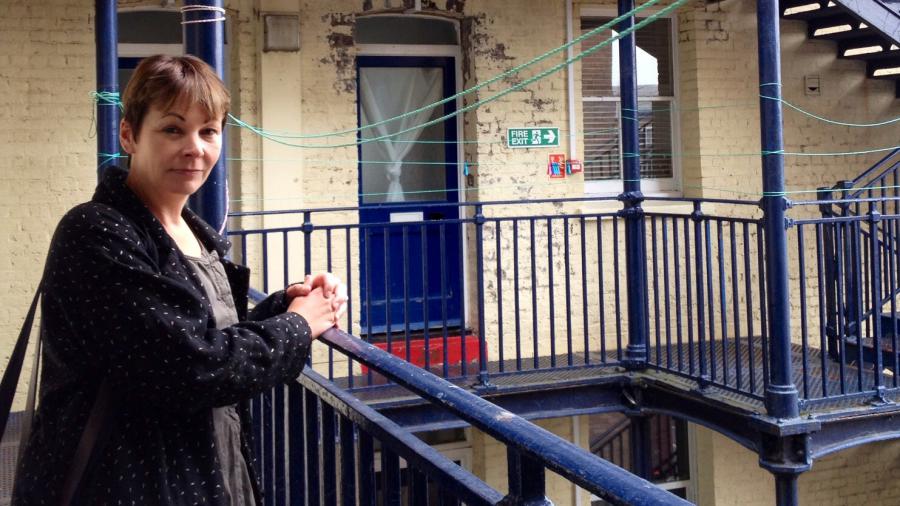I’m making a submission today as I’m keen to raise concerns put to me in advice surgeries and constituency casework, particularly about the quality of emergency accommodation for those whose housing situation is precarious.
No rough sleeping in the city by 2020 is a powerful vision and I’m keen to see it realised. However, as you’ll see from my submission below, there needs to be a step change in housing policy if homelessness is to be prevented in the first place.
If you’d like to have your say the consultation is open until Sunday (17th April) and can be found here:
PICTURED: Caroline visits Windsor Court, emergency housing on Windsor Street
-------------------------------
Dear Sir/Madam
Thank you for this opportunity to comment on the draft Rough Sleeping Strategy 2016.
Firstly, I welcome the status given to working in partnership, in that it’s identified as a strategic principle. While joint working ensures that services are as effective as possible, the inclusion of this as a strategic principle gives due recognition for Brighton & Hove’s many groups doing excellent work on rough sleeping.
I welcome the references to making Brighton & Hove a “Safe City”. However, I trust that moving people away from the sight of visitors will not be prioritised over exploration of innovative ways of providing more emergency and temporary accommodation or driving up standards and safety in existing provision. In particular, consideration might be given to whether it would be more cost-effective for the Council to build its own temporary accommodation, rather than paying out significant amounts of money to providers, over whom it often appears the Council has little leverage when it comes to improving standards.
On the safety of the individuals whose housing situation is precarious, I would highlight experiences that have been put to me in advice surgeries and constituency casework: that in some cases emergency and temporary accommodation is of such poor quality that people have preferred to sleep rough, as rough sleeping felt safer. I note that Dr Tim Worthley, Lead GP at Brighton Homeless Healthcare and CCG clinical lead for Homelessness, has described himself as “fearful” over the health of the most vulnerable persons in our city who find themselves placed in emergency accommodation. Similarly, I share concerns that Dr Worthley has put forward about cuts to the Housing Support Service and the loss of support this implies for rough sleepers who have been placed in emergency accommodation.
Overall, I would like to see more in the strategy on evaluation against the goals and also on resourcing for the steps proposed in the document. This is because I worry that the vision of no-one having the need to sleep rough in Brighton & Hove by 2020 could well be unachievable on existing budgets and within the current direction of Government policy.
For example, from what I’ve seen in constituency surgeries and casework, I’m concerned that homelessness – which can happen with very little warning - is becoming increasingly likely for many people as a direct result of the Government’s welfare reforms. I welcome acknowledgement of this in the strategy, and of the fact that increased vulnerabilities arising from welfare reforms are compounded by the housing crisis, which is particularly acute here in Brighton & Hove. Our city’s shortage of affordable housing and limited housing options – for young single people in particular – are very worrying. Insecurity in the private rented sector is a deep concern too, particularly as the charity Crisis says that the leading cause of homelessness in England is the loss of a private tenancy.
I welcome the strategy’s call for investigation into creative solutions to increase accommodation options, including temporary affordable homes for single people. I would like to see more detail on this as it is exactly the kind of preventative action that could avoid someone becoming a rough sleeper. Similarly, more robust action to end to discrimination by letting agents against those on benefits, work with lenders on a right to rent and other help for those struggling with mortgage payments, five-year tenancies as the legal default (with shorter tenancies by agreement) and reform of the Local Housing Allowance to take account of actual housing costs are all measures that could help to avoid homelessness in the first place. I would like to see a Living Rent Commission established, modelled along the lines of the Living Wage Commission. This body could explore ways to bring rent levels in line with the cost of living and could introduce smart rent controls so that rents don’t rise faster than inflation, guaranteeing fairness and predictability for tenants and landlords. The Commission would need to take account of a range of factors, including lack of housing supply and the relationship between rent levels and landlords’ ability to cover essential costs.
Alongside these measures there is a desperate need for more homes, both new homes as part of a mass programme of sustainable council and social housing, and action to bring empty homes back into use.
I recognise that the local strategy needs to be complemented by political lobbying for more resources and will continue to raise these issues in Parliament, in the hope that the vision for 2020 can become achievable.
Best wishes
Caroline




Join The Discussion